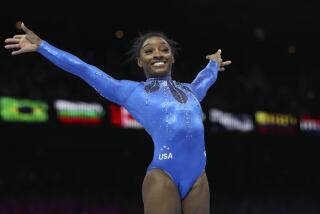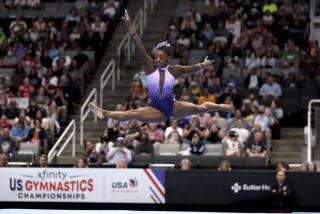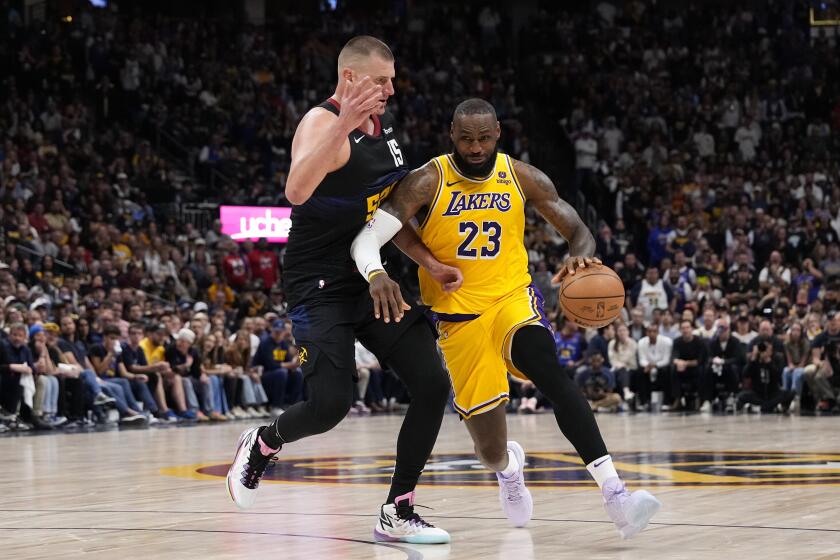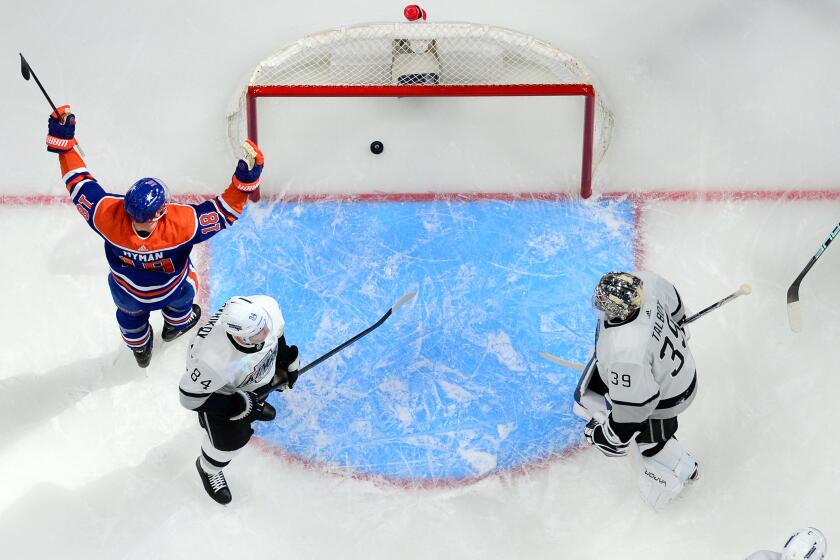Michael Phelps returns to competitive swimming with second-place finish
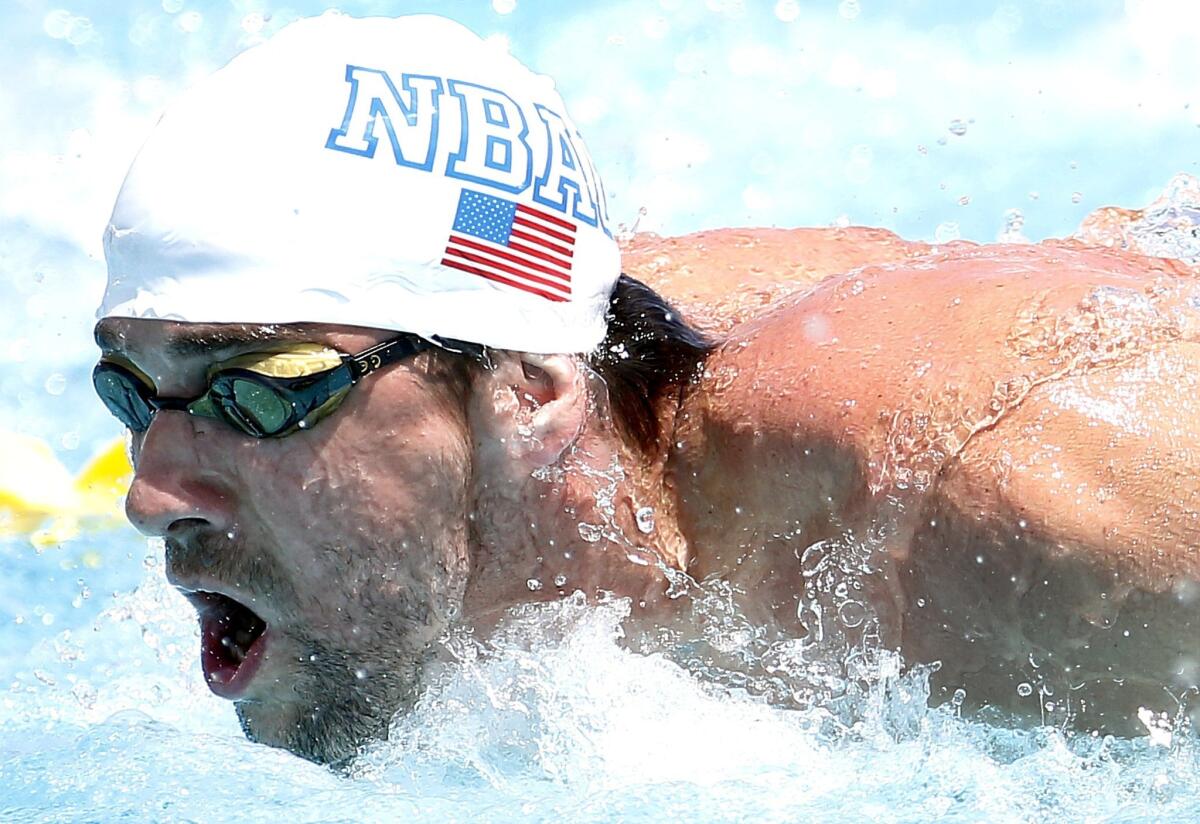
MESA, Ariz. — A buzz ran through the crowd, an accumulation of murmurs and applause that drifted across the pool to where Michael Phelps stood. It was just loud enough to make the swimmer grin as he stepped onto the block.
“You heard people starting to get excited,” he said.
The 1,200 spectators at poolside weren’t alone — an entire sport watched intently as the most-decorated athlete in Olympic history began his comeback from retirement this week.
With an unprecedented 22 medals from three Games, Phelps is the Michael Jordan of swimming. His hefty endorsement earnings give him the clout of a pre-scandal Tiger Woods.
Some wonder why he would risk that legacy by returning after nearly two years away. Others want to know if he plans to compete in the 2016 Rio de Janeiro Olympics.
The 28-year-old Phelps refused to dwell on such questions at the Arena Grand Prix meet, not even after a promising second-place finish to rival Ryan Lochte in the 100-meter butterfly on Thursday night. He preferred to talk about having fun.
“I felt like a summer league swimmer,” he said of his first day back. “I literally was just so excited to get in and to race.”
It seems like a lifetime ago that the Baltimore native began his Olympic odyssey at the 2000 Olympics in Sydney, Australia. That teenage debut set the stage for a historic career.
He had six gold medals and two bronze at the 2004 Athens Games.
Not only did Phelps win eight gold medals at the 2008 Beijing Olympics, he also set four individual world records. Four years later, in London, he walked away with four more golds and two silvers.
He also — supposedly — walked away from racing, insisting there was nothing left to accomplish and he was “ready to be done.”
His departure hurt a sport that had benefited from his crossover appeal, which attracted growth in participation and sponsorship dollars.
“I can’t overemphasis how critical he was been to swimming,” said Rowdy Gaines, the former Olympic medalist and current analyst for NBC Sports. “He has been the most critical component.”
Phelps spent the past year and a half doing what young, wealthy, former athletes are supposed to do.
“I traveled, I played golf, I gained 30 pounds,” he said. “I had a lot of fun.”
But something was missing, something that Subway commercials and a stint on Hank Haney’s golf show could not satisfy. Maybe it was the thrill of competition. Or the training routine that had brought order to his life for so many years.
Phelps joked that he needed to tame his expanding waistline. But that was a small part of the equation.
“I missed being in the water,” he said.
Last fall, he resumed training at the North Baltimore Aquatic Club and re-entered the U.S. Anti-Doping Agency’s testing program, beginning the waiting period required to compete.
At a news conference in Mesa this week, Coach Bob Bowman told reporters his star pupil was “so out of shape” at the start.
“Easy,” Phelps interrupted. “Sugar-coat it, at least.”
“It took a while until, OK, he can [swim] in public,” Bowman pressed on. “It was a process. It is a process.”
Working at a lighter, smarter pace — one the befits his age — Phelps has lowered his weight to the mid-190s and brought his times down. He has also narrowed his focus, concentrating on shorter races.
His comeback officially began on a breezeless desert day, with the grandstands filled and a media presence five times larger than it had been for this event last year.
“It definitely adds some extra energy to the meet,” said Olympic medalist Katie Ledecky, who won the women’s 400-meter freestyle on Thursday. “Most of all, the swimmers are really excited.”
Phelps clearly enjoyed himself, seeming upbeat and looser than in previous years. Before the butterfly prelim, he cracked that smile and stepped up to the starting blocks a little early.
“I felt like I should have my heat and lane written on my hand in case I forgot,” he said. “I didn’t want to wait any more.”
His performance in the final included a slow start and what he called “maybe the worst turn of my career” — glitches that can be fixed. Still, his time of 52.13 seconds matched the fifth fastest of the year and should add fire to speculation about Rio.
Lochte, whose time was 51.93, said his rival had not lost the ability to finish, that racer’s knack for getting a hand on the wall. Gaines put it this way: “He’s the greatest of all time for a reason. He has always been able to step up to that competition.”
Asked repeatedly about the future, Phelps suggested that everyone take a deep breath and let him proceed one step at a time. He has the 50-meter butterfly on Friday and perhaps a couple more Grand Prix events this spring.
As for the legacy issue, fellow swimmers believe he has nothing left to prove. Natalie Coughlin said: “This is all icing on the cake.”
Phelps seemed to agree.
“I’m doing this for me,” he said. “If I don’t become as successful as you all think I should be and you think it tarnished my career, then that’s your opinion.”
Twitter: @LATimesWharton
More to Read
Get our high school sports newsletter
Prep Rally is devoted to the SoCal high school sports experience, bringing you scores, stories and a behind-the-scenes look at what makes prep sports so popular.
You may occasionally receive promotional content from the Los Angeles Times.

